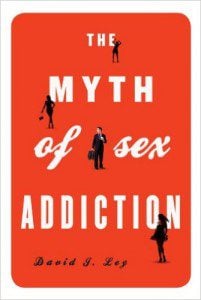 I have written and talked a lot about the controversial issues surrounding “sex/porn addiction.” This has been such an important topic for me to focus on because of the large amounts of LDS people who have come through my office having either self-diagnosed or spouse-diagnosed as an addict (for usually much less behavior than the general population), organized their sexuality around a shame-based/disease model, and often times spent years and large sums of money getting treatment that is inappropriate to begin with. This does not mean that I am an advocate for pornography use or in having people act in ways that go against their religious values. But it does mean that I want people to be able to have access to accurate and comprehensive sexual education and adequate mental health treatment.
I have written and talked a lot about the controversial issues surrounding “sex/porn addiction.” This has been such an important topic for me to focus on because of the large amounts of LDS people who have come through my office having either self-diagnosed or spouse-diagnosed as an addict (for usually much less behavior than the general population), organized their sexuality around a shame-based/disease model, and often times spent years and large sums of money getting treatment that is inappropriate to begin with. This does not mean that I am an advocate for pornography use or in having people act in ways that go against their religious values. But it does mean that I want people to be able to have access to accurate and comprehensive sexual education and adequate mental health treatment.
To simplify this as much as possible I talk about sexual behavior that becomes a problem in the following ways:
- It can be problematic. Meaning one can act in ways that goes against their own religious/moral codes, doesn’t meet the expectations of how their society/culture expects them to act, or impedes upon a relational sexual contract (one partner is comfortable with something the other is not).
- It can be maladaptive. Meaning the behavior has become such a focus in the person’s life that it now interferes with the quality of their daily living (i.e. work is hampered, finances spent, time management, social/relational ramifications, etc.).
- It can be criminal. Meaning coercion, non-consentual practices, boundary-crossing, violence, and power differentials are at play.
Now let’s look at the appropriate treatment/response for each of these.
- Problematic sexual behavior needs to be explored in a non-biased, non-shaming therapeutic environment to help the client explore what their assumptions about healthy sexuality are, what they want them to be and how others’ beliefs around these issues are impacting their personal authority. Work can center on conflicts between values and behavior and why they might exist, developing sexual maturity/responsibility and sex education (often normalizing what people mistakenly think is not normal). Work often includes marriage/relational counseling, helping couples sexually contract in ways that they usually have never been taught to consider.
- Maladaptive sexual behavior is usually a symptom of something else that is underlying. This is where correct clinical assessment is very important. Are we dealing with clinical depression, an anxiety disorder, past trauma, developmental disorders, personality disorders, substance dependence, etc.? And there are best-practice treatment approaches for all of these diagnoses, none of which include sex addiction treatment.
- Criminal sexual behavior needs to be referred to policing authorities first and foremost. Treatment can ensue after that first step. And unfortunately, much sexual sentencing is reduced due to the ability to use “sex addiction” as an excuse. “I couldn’t help myself.” This excuse also tends to be used with abusive sexual behavior (i.e. chronic infidelity in a monogamously contracted relationship).
Sex addiction treatment is flawed in several ways:
- It relies on a model that is not evidence-based, supported by research (although the vast amount of media claims would have you think otherwise) or considered a best-practice approach.
- It relies on a diagnosis that does not exist.
- It certifies professionals who have little to no training in sexual education. The training is short-term (compared to what certified sex therapists are expected to go through and learn; weeks instead of years), biased and based on one person’s model that was formulated in the 1980’s.
- It focuses on sexual behavior accountability instead of treatment (on the symptom instead of the problem).
- It imposes cultural/religious/heteronormative values on clients from a “medical” perspective, which actually goes against the ethics codes of all mental health professionals.
Tomorrow I will have a guest post from Dr. David Ley, author of The Myth of Sex Addiction, on the problems with assessment tools used by those within sex addiction treatment centers.
For much more detailed information on these types of issues, I have been creating several podcasts interviewing professionals in the field of sexology (including Dr. Ley) who do an excellent job explaining the problems with the supposed research on this topic, treatment issues as I mention above, etc. Those can be found at Mormon Sex Info.
From Sex Addiction to Sex Positivity
Neuroscience and “Sex/Porn Addiction”: How do we make sense of all this info?
What Research has to Say about Porn Viewing
Natasha Helfer Parker, LCMFT, CST can be reached at natashaparker.org. She authors the Mormon Therapist Blog, hosts the Mormon Mental Health and Mormon Sex Info Podcasts, writes a regular column for Sunstone Magazine and is the current president of the Mormon Mental Health Association. She has 20 years of experience working with primarily an LDS/Mormon clientele.











